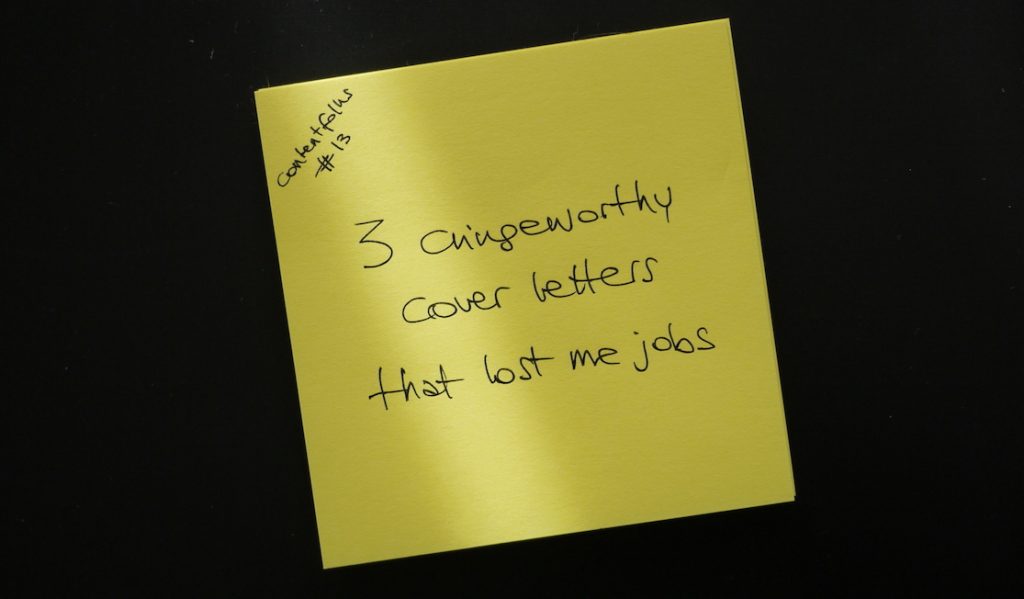
Welcome to contentfolks—a fortnightly newsletter with short lessons & ideas about content that makes a difference, sparks action, and truly serves its audience. Thank you for being here!
Hey 👋
Throughout your career, there will be times when you’re writing for an audience of one: the person reviewing your job application cover letter.
Just like any piece of content, a cover letter works best when you’ve taken the time to understand your audience and empathise with what they need.
I’ve written dozens and reviewed thousands, and have a pretty good idea of what works and doesn’t. So let’s do this—and get ready to see a few examples of truly horrible cover letters I cannot believe I ever sent out 😅
If you’re applying for a content role, A) add a cover letter and B) make it a great one
A quick bit of context:
A few years back, my team got ~700 applications for a single content writer role. Spending 3 minutes on each would have amounted to 40 hours of work (obviously undoable) so we had to look for shortcuts. The easiest one: ignore everything else and start from the cover letter.
About ~500 applicants pretty much disqualified themselves at that stage: a third for not having a cover letter at all, and two thirds for doing a poor job of it.
Last week, I found this LinkedIn thread from Director of Marketing Erin Balsa, who is going through the same experience. She is hiring a technical writer and finding that a lot of applicants either don’t submit a cover letter or write a bad one:
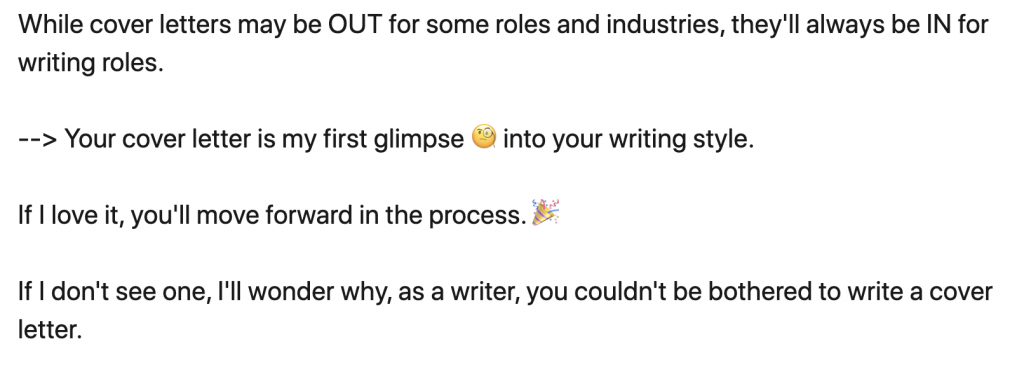
The thread also reconfirmed what I knew to be true: that cover letters are an afterthought for a lot of applicants—and, conversely, that sending one gives you a solid chance to stand out:

After finding that thread, I invited Erin to hop on a call for a joint thinking session, we compared notes, and came up with the 4 pointers below.
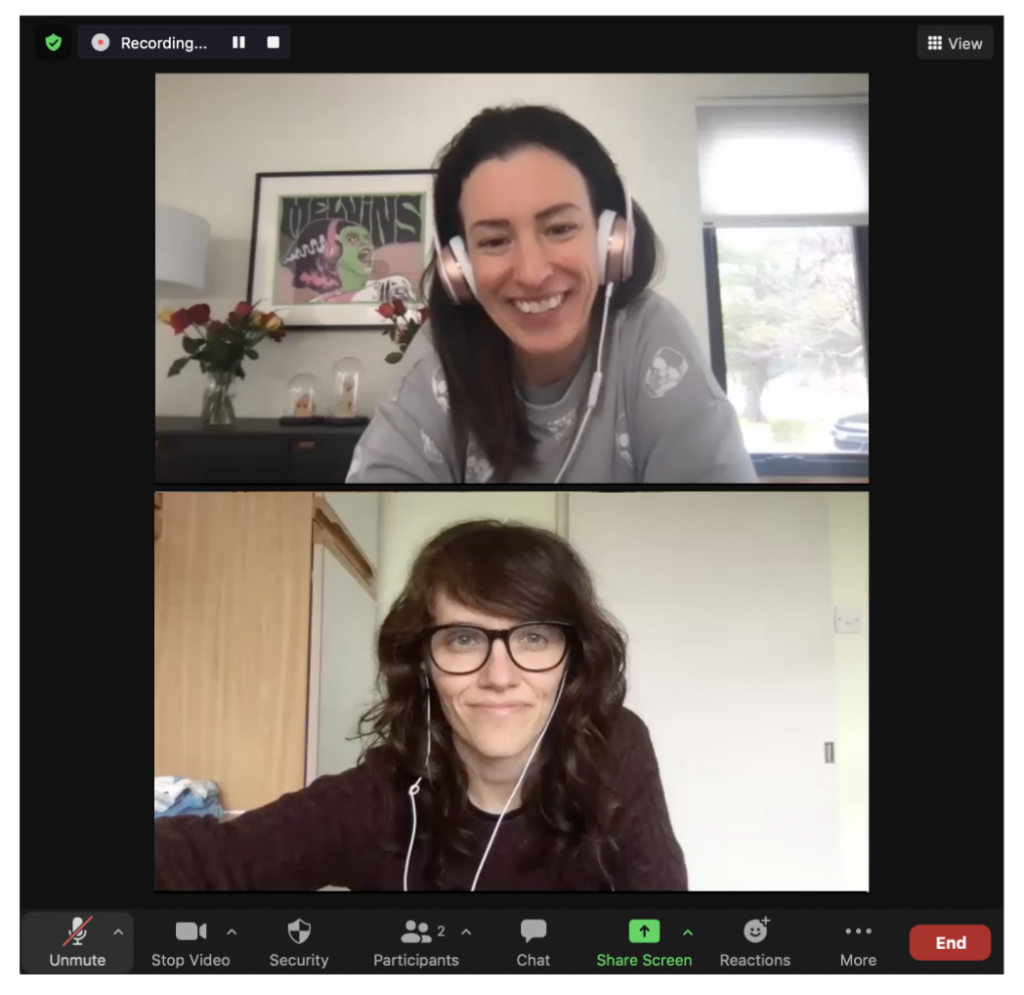
4 elements of a strong cover letter—according to two people who have seen a lot of them
In our experience as people who have hired content writers and marketers, a cover letter is non-negotiable. Plus, a great cover letter does 4 things extremely well:
#1. It positions you in the hiring person’s mind
The cover letter explains who you are, what makes you uniquely qualified, and what benefits you bring, in maximum two sentences.
Why this is important → us folks reviewing your application probably have a couple of hours and dozens of cover letters to go through. We’re looking for early signs that you get what the job entails & can articulate why YOU are the right person for it.
#2. It’s concise and well-constructed
Sentences and paragraphs are well-organised and clear. Your words have been proofread. You tell a good story and know how to do it quickly.
Why this is important → a cover letter is our first glimpse into your ability as a writer or content creator: if we’re finding it hard to follow, you’ve already lost us.
#3. It shows your personality
Your letter reads like it’s coming from you: a real person with likes, dislikes, and quirks.
Why this is important → we are looking for someone who would not just fit with, but make a great addition to our existing team. Even if it’s grammatically impeccable, an impersonal letter tells us very little about who wrote it.
#4. It shows that you care about *this* role
Your letter shows that you’ve done your research about the company and role, and you are actively interested in both.
Why this is important → we want to see that you’ve bothered to spend some time understanding the larger context. You don’t need to know the entire history of the company—but we can 100% tell if your cover letter is a copy-paste job.
3 practical examples of what NOT to do
This is where things become cringeworthy… 😅
In the spirit of being useful, I went back into my archives and found a few examples of old cover letters that are, for lack of a better word, horrible. Let me offer them up as an example of what you should not do!
Exhibit A: the “this is all about me” opening paragrap

No-bo-dy cares about my autobiography, or that I made a ‘consistent effort to acquire solid and effective professional skills’: they want to know if I have them or not. And what are ‘various marketing-related environments’ anyway?
This was for the marketing team at the University of Nottingham: you can imagine the reply.
Exhibit B: the “add in some big words to sound smart” trick

‘Ever-growing’, ‘prompted’, and (wait for it) ‘provided me with a multi-dimensional understanding of small- and medium-sized art organisations’ (…WTF?!). I was applying for a job at a theatre company! Nobody expected me to use big words. Are we surprised I didn’t even get an interview?
Exhibit C: the “let me tell you how great I am” closing statement

This is such a classic example of telling instead of showing. Everybody can say they ‘have learned to approach the needs of groups and individuals creatively,’ but what does that look like, practically speaking? What did I actually do? The hiring manager will never know (and I will never hear back from them, obviously).
I wrote such weak cover letters because of a combination of inexperience, looking for generic career advice online, going to a couple of ‘applying for a job’ workshops organised by my university, and copying a template or two.
I wish I could reach back in time and tell my past self “oh, honey, no.”
3 practical examples of what to do
After many rejections, I tried a new approach: empathy. I decided to ignore the rules and advice I’d been given and started writing to connect with the person behind the screen.
This was for a marketing role with a Shakespearean theatre company:
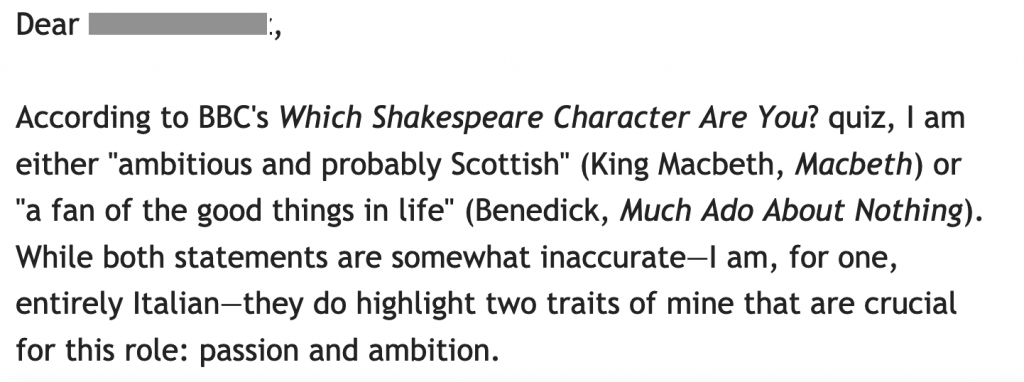
It’s maybe a bit over-eager, but compare it to the ones I showed before—here, I managed to make it relevant to the hiring manager, add some humour, and sneak in a few factoids about myself in just two sentences.
Got an interview. Got the job.
Some years later, this was for a content role at Hotjar:
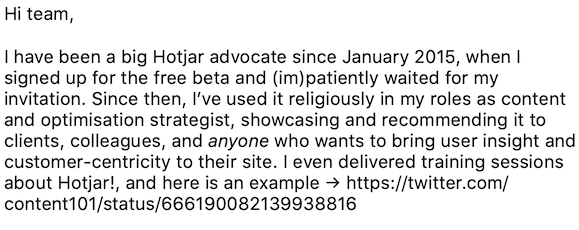
I was a huge product fan, I knew exactly who their audience was, and I had tangible proof of that. Why not be obvious about it from the start? 😉
Got an interview. Didn’t get the job—but they created one for me after. (I learned later there had been 1000+ candidates for this position. Woah.)
And this is from November 2020, for a part-time product marketing role:
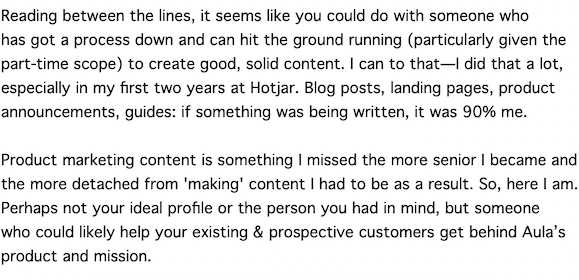
I applied despite having a largely different profile than the one advertised. With this letter, I wanted to show the hiring manager that I understood what they needed and would be an asset even if I wasn’t the person they originally had in mind.
Got an interview. Got the role. Currently there!
I wish I’d seen some of these examples and understood the behind-the-scenes of hiring much sooner than I did. I wish I had Erin, back then, take me through everything I was doing wrong.
So this is my way of paying it forward—I hope my cringeworthy examples will help you get the job you deserve this year 😉
